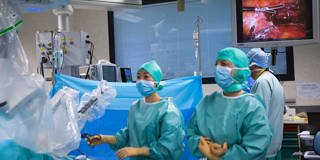We shouldn’t expect machines to replace physicians for some time, but automation will continue to make inroads in the evolving health-care landscape, and we should welcome this. Practicing more precision medicine than intuitive medicine will make health care simpler, more accessible, and less expensive.
LEXINGTON, MASSACHUSETTS – Although intelligent machines are increasingly operating complex manufacturing systems and replacing humans on factory floors, they have not made significant inroads in health care. The sector’s most advanced machines, from ultra-high-resolution imaging instruments to surgical robots, are still fully controlled by humans.
But as robotic and artificial-intelligence (AI) systems become more advanced, will they eventually render doctors and nurses obsolete, with patients consulting a computer instead? The short answer is: not anytime soon. Health-care professionals will certainly become increasingly dependent on machines; but technology will augment, not replace, their abilities, and doctors will remain in charge of medical practices.
In his 2009 book The Innovator’s Prescription, Harvard Business School’s Clayton Christensen identified a spectrum of medical practices that range between “intuitive” and “precision.” Intuitive medicine describes when a doctor interprets a patient’s symptoms to arrive at a diagnosis and prescribe a treatment, the efficacy of which is often uncertain. Precision medicine – which should not be confused with personalized medicine – describes a rules-based process by which standardized treatments with predictable outcomes are applied to known health conditions.

LEXINGTON, MASSACHUSETTS – Although intelligent machines are increasingly operating complex manufacturing systems and replacing humans on factory floors, they have not made significant inroads in health care. The sector’s most advanced machines, from ultra-high-resolution imaging instruments to surgical robots, are still fully controlled by humans.
But as robotic and artificial-intelligence (AI) systems become more advanced, will they eventually render doctors and nurses obsolete, with patients consulting a computer instead? The short answer is: not anytime soon. Health-care professionals will certainly become increasingly dependent on machines; but technology will augment, not replace, their abilities, and doctors will remain in charge of medical practices.
In his 2009 book The Innovator’s Prescription, Harvard Business School’s Clayton Christensen identified a spectrum of medical practices that range between “intuitive” and “precision.” Intuitive medicine describes when a doctor interprets a patient’s symptoms to arrive at a diagnosis and prescribe a treatment, the efficacy of which is often uncertain. Precision medicine – which should not be confused with personalized medicine – describes a rules-based process by which standardized treatments with predictable outcomes are applied to known health conditions.